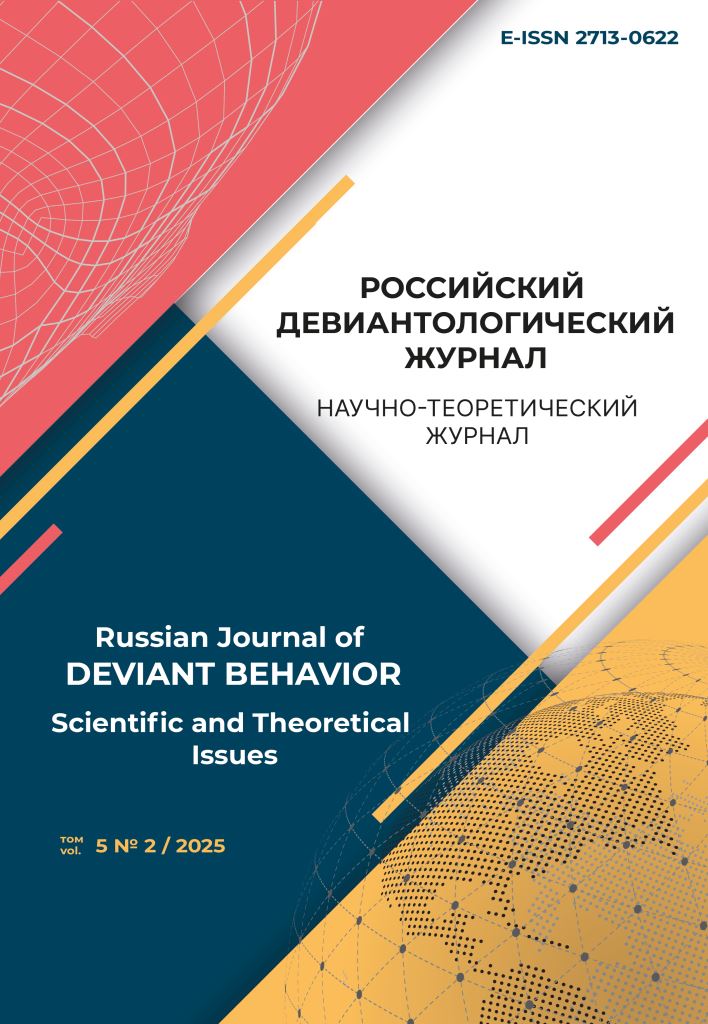Russian Federation
Russian Federation
UDC 159.922.8
Introduction. In adolescence, the ability to cope with social and psychological challenges becomes especially important, which actualises the request to study the adaptation potential of adolescents. The study of semantic self-regulation as a resource of psychological adaptability of adolescents, taking into account their childhood experience and age-related neoplasms, makes it possible to predict and prevent manifestations of maladaptation and becomes the basis for the development of proactive coping strategies that determine the resilience of adolescents during adulthood. Research methods. The authors used a structured interview, social and psychological adaptation test (K. Rogers, R. Diamond, adapted by A. Prikhozhan), clinical questionnaire for detection and assessment of neurotic states (K.K. Yakhin, D.M. Mendelevich), “Ways of coping behavior (WCQ)” technique (R. Lazarus, S. Folkman, adapted by Bekhterev Scientific Research Institute), life-meaning orientation test (J. Crambaugh and L. Makholika, adapted by D.A. Leontiev), hardiness test (S. Maddy, adapted by D.A. Leontiev, E.I. Rasskazova). Methods of mathematical and statistical analysis, Kolmogorov-Smirnov criterion, Mann-Whitney U-criterion were used. Research results. It was found that 75% of respondents had at least one type of unfavourable childhood experience. Adolescents with unfavourable childhood experiences had significantly lower levels of adaptability and life meaningfulness, but higher levels of neurotic symptoms (asthenia, vegetative disorders, neurotic anxiety and depression) and maladaptive coping strategies (distancing, confrontation, escape-avoidance) compared to normative values and similar indicators in the comparison group. Adolescents with unfavourable childhood experience in anamnesis and having a high level of life meaningfulness have a higher degree of psychological adaptability and less pronounced indicators of maladaptation in comparison with adolescents with similar experience and a low level of life meaningfulness.
motivation, achievement motivation, failure avoidance motivation, alcohol-dependent inmates, rehabilitation
1. Gabdulina, L. I., Kuz'mishchenko, I. N. (2008). Osmyslennost' zhizni i strategii sovladayushchego povedeniya u muzhchin i zhenshchin srednego vozrasta. Severo-Kavkazskij psihologicheskij vestnik, 6 (1), 72–76.
2. Gor'kovaya, I. A., Miklyaeva, A. V. (2018). Zhiznestojkost' i koping-strategii podrostkov s sensornymi i dvigatel'nymi narusheniyami. Izvestiya RGPU im. A. I. Gercena, (187), 85–95.
3. Katan, E. A. (2019). Ispol'zovanie mezhdunarodnogo oprosnika neblagopriyatnogo detskogo opyta dlya vyyavleniya psihotravmiruyushchih faktorov v detskom i podrostkovom vozraste. Medicinskaya psihologiya v Rossii, 11 (2 (55)), 8.
4. Krylova, M. A. (2019). Otnoshenie molodyh lyudej k trudnym zhiznennym situaciyam: mental'naya reprezentaciya i sovladayushchee povedenie. V Metodologiya, teoriya, istoriya psihologii lichnosti: sbornik statej (str. 663-671). Moskow: Institut psihologii RAN.
5. Kryukova, T. L. (2004). Psihologiya sovladayushchego povedeniya: monografiya. Kostroma: Izdatel'stvo «Avantitul».
6. Leonenko, N. O., Lobanova, Yu. A. (2021). Psihologicheskoe blagopoluchie v yunosheskom vozraste ulic s raznym opytom perezhivanij. Gercenovskie chteniya: psihologicheskie issledovaniya v obrazovanii, (4), 333–341. https://doi.org/10.33910/herzenpsyconf-2021-4-41
7. Leonenko, N. O., Lobanova, Yu. A. (2022). Opyt neblagopriyatnyh perezhivanij detstva i psihicheskoe zdorov'e vzroslogo: otdalennye posledstviya i prediktory sovladaniya. V Psihologiya stressa i sovladayushchego povedeniya: ustojchivost' i izmenchivost' otnoshenij, lichnosti, gruppy v epohu neopredelennosti: materialy VI Mezhdunarodnoj nauchnoj konferencii (str. 338–342). Kostroma: Kostromskoj gosudarstvennyj universitet.
8. Leont'ev, D. A. (1992). Test smyslozhiznennyh orientacij (SZHO). Moskow: Izdatel'stvo «Smysl».
9. Leont'ev, D. A. (2007). Psihologiya smysla: priroda, stroenie i dinamika smyslovoj real'nosti. Moskow: Izdatel'stvo «Smysl».
10. Leont'ev, D. A. (2014). Razvitie lichnosti v norme i v zatrudnennyh usloviyah. Kul'turno-istoricheskaya psihologiya, 10 (3), 97–106.
11. Leont'ev, D. A. (2016). Samoregulyaciya, resursy i lichnostnyj potencial. Sibirskij psihologicheskij zhurnal, (62), 18–37.
12. Leont'ev, D. A., Rasskazova, E. I. (2006). Test zhiznestojkosti. Moskow: Izdatel'stvo «Smysl».
13. L'vova, E. N. (2017). Lichnostnoe oposredstvovanie vybora strategij sovladaniya v situacii neopredelennosti: avtoref. dis. … kand. psihol. nauk. Moskow.
14. Maddi, S. (2002). Teorii lichnosti: sravnitel'nyj analiz. Saint Petersburg: Izdatel'stvo «Rech'».
15. Mendelevich, D. M. (2005). Psihologiya deviantnogo povedeniya. Saint Petersburg: Izdatel'stvo «Rech'».
16. Nurkova, V. V. (2018). Ot haosa povsednevnogo opyta k istorii zhizni: sociokul'turnoe formatirovanie avtobiograficheskogo samosoznaniya. Issledovatel'/Researcher, 3–4 (23–24), 10–24.
17. Osnickij, A. K. (2004). Opredelenie harakteristik social'noj adaptacii. Psihologiya i shkola, (1), 43–56.
18. Sinel'nikova, E. S., Udovichenko, P. A. (2023). Smyslozhiznennye orientacii i samoregulyaciya kak psihologicheskie korrelyaty konstruktivnogo sovladaniya so stressom v yunosheskom vozraste. Teoreticheskaya i eksperimental'naya psihologiya, 16 (1), 79–89. https://doi.org/https://doi.org/10.11621/TEP-23-05
19. Tarabrina, N. V. (2009). Psihologiya posttravmaticheskogo stressa: monografiya: Teoriya i praktika. Moskow: Institut psihologii RAN.
20. Frankl, V. E. (1990). Chelovek v poiskah smysla. Moskow: Izdatel'stvo «Progress».
21. Hazova, S. A. (2002). Sovladayushchee povedenie odarennyh starsheklassnikov: dis. … kand. psihol. nauk. Kostroma.Başkale, H., & Solmaz, P. (2024). Experiences of adolescents affected by earthquakes: A qualitative study. Journal of Specialist Pediatric Nursing, 29 (3), e12434. https://doi.org/10.1111/jspn.12434
22. Başkale, H., & Solmaz, P. (2024). Experiences of adolescents affected by earthquakes: A qualita-tive study. Journal of Specialist Pediatric Nursing, 29 (3), e12434. https://doi.org/10.1111/jspn.12434
23. Ferris, C., & O'Brien, K. (2022). The ins and outs of posttraumatic growth in children and adolescents: A systematic review of factors that matter. Journal of Traumatic Stress, 35 (5), 1305–1317. https://doi.org/10.1002/jts.22845
24. Hughes, K., Bellis, M. A., Hardcastle, K. A., et al. (2017). The effect of multiple adverse childhood experiences on health: A systematic review and meta-analysis. Lancet Public Health, 2 (8), 356–366.
25. Kaye-Tzadok, A., & Icekson, T. (2022). A phenomenological exploration of work-related post-traumatic growth among high-functioning adults maltreated as children. Frontiers in Psychology, 13, 1048295. https://doi.org/10.3389/fpsyg.2022.1048295
26. Le-Deist, F. D., & Winterton, J. (2005). What is competence? Human Resource Development International, 8 (1), 27–46. https://doi.org/10.1080/1367886042000338227
27. Quan, L., Lü, B., Sun, J., Zhao, X., & Sang, Q. (2022). The relationship between childhood trauma and post-traumatic growth among college students: The role of acceptance and positive reapprais¬al. Frontiers in Psychology, 13, 921362. https://doi.org/10.3389/fpsyg.2022.921362














